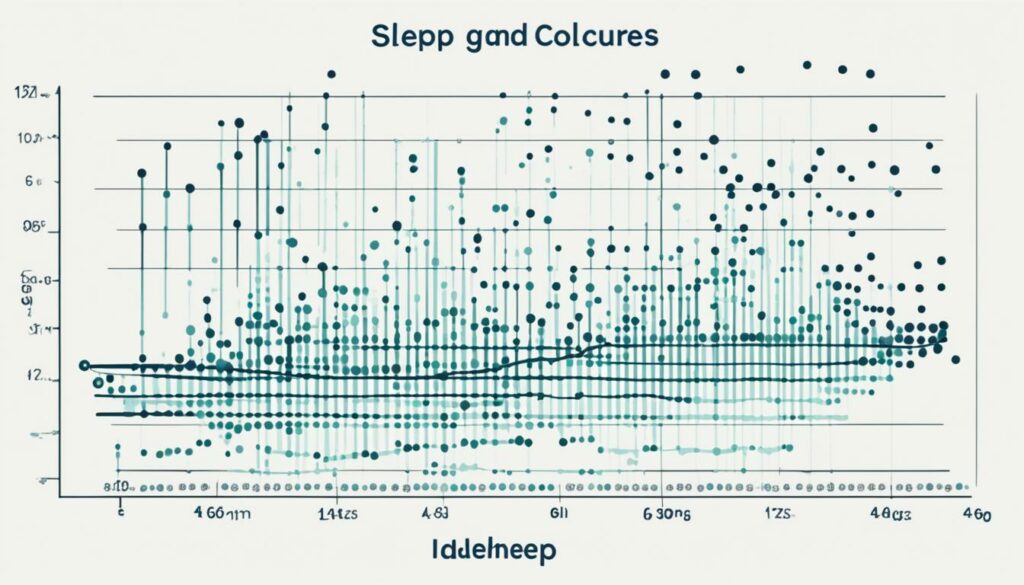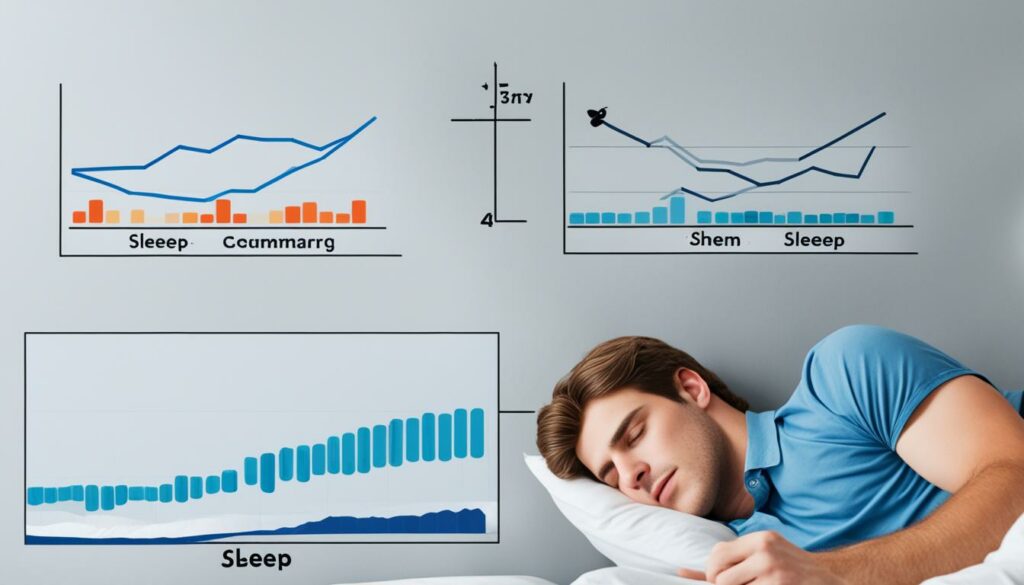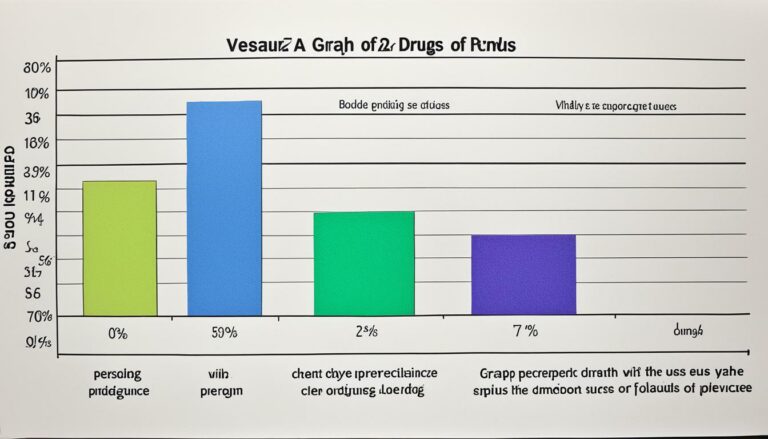Optimal Teen Sleep Needs: Find Out Today!
Welcome to our informative guide on the optimal sleep needs for teenagers. Sleep plays a crucial role in the overall health and well-being of adolescents, and understanding their recommended sleep duration is essential for their development.
According to the American Academy of Sleep Medicine, it is recommended that teenagers aged 13-18 years get 8-10 hours of sleep per night to support their physical and mental well-being. However, many teens are not meeting these guidelines, which can lead to various health and behavior problems.
It is important for parents, caregivers, and educators to be aware of the sleep requirements for adolescents and take steps to promote healthy sleep habits. By prioritizing sleep, we can help teenagers thrive academically, emotionally, and physically.
Key Takeaways:
- Teenagers aged 13-18 years need 8-10 hours of sleep per night.
- Inadequate sleep can lead to health and behavior problems in teens.
- Prioritizing healthy sleep habits is crucial for teenagers’ overall well-being.
- Parents, caregivers, and schools should support teenagers’ sleep needs.
- Recommended sleep duration for teenagers promotes optimal academic performance and emotional well-being.
The Impact of Sleep Deprivation on Teens

Sleep deprivation can have a profound impact on the well-being of teenagers. It can lead to a higher risk of obesity, diabetes, injuries, poor mental health, and difficulties with attention and behavior. Prioritizing sleep and establishing good sleep habits is crucial for supporting the physical and mental health of teenagers.
The American Academy of Sleep Medicine recommends that teenagers aim for 8-10 hours of sleep per night to ensure optimal health and functioning.
Sleep deprivation in adolescents has been linked to a higher risk of obesity, diabetes, injuries, poor mental health, and problems with attention and behavior.
The Importance of Sleep for Teenagers
Quality sleep is essential for teenagers as they undergo physical, mental, and emotional changes. During adolescence, sleep patterns naturally shift, making it challenging for teens to fall asleep before 11 p.m. Despite these changes, it is crucial for teenagers to prioritize sleep to support their overall well-being.
“Sleep deprivation affects teens’ physical health, mental health, and behavior. By getting enough sleep, teenagers can improve their cognitive functioning, mood, and overall quality of life.”
Teenagers who consistently lack adequate sleep may experience difficulties with memory, attention, and concentration. These sleep deficits can also contribute to an increased risk of anxiety, depression, and other mental health issues. Additionally, insufficient sleep can lead to weight gain and impair driving safety, as drowsy driving poses a significant risk to the teenager and others on the road.
To ensure that teenagers are getting the recommended amount of sleep, it is essential for parents, caregivers, and schools to educate and support healthy sleep habits.
Teen Sleep Guidelines
According to the American Academy of Sleep Medicine, teenagers aged 13-18 years should aim for 8-10 hours of sleep per night. This recommendation takes into account the physiological changes that occur during adolescence and the importance of sufficient sleep for teenagers’ overall health and well-being.
| Sleep Duration Guidelines for Teenagers | |
|---|---|
| Age | Recommended Sleep Duration |
| 13-18 years | 8-10 hours per night |
Sleep Patterns in Adolescence
During adolescence, changes in the circadian rhythm can cause a delay in the natural sleep-wake cycle. As a result, teenagers may struggle to fall asleep earlier in the evening, making it more challenging to get the recommended amount of sleep.
“Understanding the sleep patterns of teenagers is crucial for addressing their sleep needs and ensuring they get sufficient rest.”
It is important to support teenagers in establishing consistent sleep schedules and creating a sleep-friendly environment that promotes relaxation before bedtime. Limiting exposure to electronic devices before sleep can also contribute to better sleep quality.
Sleep Patterns and Statistics among Teens

America’s Teenagers: Losing Sleep
Sleep deprivation in adolescents has become a significant concern in today’s fast-paced and technology-driven world. According to a study conducted by the Centers for Disease Control and Prevention (CDC), a staggering 57.8% of middle school students and 72.7% of high school students in the United States do not get enough sleep on school nights.
This lack of sleep among teens can have serious implications for their overall well-being. Sleep deprivation can lead to various attention and behavior problems, ultimately impacting their academic performance and overall quality of life. It is crucial for parents, educators, and healthcare professionals to address this issue and prioritize ensuring that teenagers are getting the recommended amount of sleep each night.
Disturbing Statistics:
“Insufficient sleep among children and adolescents is associated with a wide range of negative outcomes, including poor physical health, obesity, cognitive impairment, behavioral problems, and accidents.”
Source: National Center for Biotechnology Information
Recognizing the prevalence of sleep deprivation among teens is essential for understanding the urgency of addressing this issue. By shedding light on the average hours of sleep for teens, the severity of sleep deprivation in adolescents, and the importance of adhering to teen sleep recommendations, we can take the necessary steps to promote healthier sleep patterns and overall well-being in our youth.
Teen Sleep Statistics:
| Sleep Statistics | Middle School Students | High School Students |
|---|---|---|
| Percentage of students not getting enough sleep on school nights | 57.8% | 72.7% |
These statistics highlight the alarming prevalence of sleep deprivation among teens in the United States. Teenagers require adequate sleep to support their physical and mental development and to excel in their academic pursuits. It is crucial for parents, educators, and healthcare professionals to work together in promoting healthier sleep habits for teenagers.
Factors Affecting Teen Sleep
Teenagers face various factors that can adversely affect their sleep. The natural shift in circadian rhythm during puberty makes it challenging for teens to fall asleep before 11 p.m. Additionally, early school start times, increased homework load, extracurricular activities, and part-time jobs contribute to sleep deprivation in teens. Social opportunities, exposure to light from electronic devices, and stress also impact their sleep patterns. It is crucial to address these factors and help teenagers establish healthy sleep habits.
Challenges of Circadian Rhythm
During adolescence, there is a natural shift in the circadian rhythm, the internal body clock that regulates sleep-wake cycles. This shift delays the release of melatonin, a hormone that promotes sleep, making it difficult for teenagers to fall asleep before 11 p.m. This delay in sleep onset, combined with early school start times, can result in inadequate sleep duration for teens.
School Schedules and Academic Demands
Early school start times often clash with the delayed sleep patterns of teenagers. Teens may need to wake up early for school, leaving them with insufficient time to get the recommended amount of sleep. Additionally, the increasing academic demands, including homework load and extracurricular activities, can further cut into their sleep time, causing chronic sleep deprivation.
Technology and Social Opportunities
The prevalence of electronic devices and social media platforms can also negatively impact teenagers’ sleep habits. Social opportunities and the desire to stay connected with peers may lead to late-night interactions and reduced sleep time. Exposure to light from electronic devices, such as smartphones and tablets, can interfere with melatonin production, making it harder for teens to fall asleep and stay asleep.
Stress and Mental Health
Teenagers often experience higher levels of stress, which can disrupt their sleep patterns. Academic pressures, social challenges, and personal issues can contribute to anxiety and restlessness, making it difficult for them to relax and fall asleep. Poor mental health, including anxiety and depression, can also lead to sleep disturbances and inadequate sleep duration in teenagers.
By addressing these factors and supporting teenagers in establishing healthy sleep habits, we can help them obtain the quality sleep they need for optimal physical and mental well-being.
Tips for Promoting Healthy Sleep Habits in Teens

Parents play a crucial role in supporting healthy sleep habits for their teenagers. By implementing a few simple strategies, you can help improve your teen’s sleep quality and overall well-being.
A consistent sleep schedule is essential for a good night’s rest. Encourage your teen to establish a regular sleep routine, going to bed and waking up at the same time every day. This helps regulate their internal body clock and promotes better sleep.
Setting a bedtime can also be beneficial. Work with your teen to determine an appropriate bedtime that allows for enough sleep based on their individual needs. Consider the recommended sleep duration for teenagers and ensure they have enough time for restorative sleep.
Limiting light exposure and technology use before bed is another effective strategy. The blue light emitted by electronic devices can disrupt the production of melatonin, the sleep hormone. Encourage your teen to avoid using screens at least an hour before bedtime to promote better sleep.
Creating a sleep-friendly environment is important for optimal rest. Ensure the bedroom is quiet, dark, and cool. Use blackout curtains or eye masks to block out any light that might disturb sleep. Promote the use of comfortable bedding and pillows to enhance comfort.
“A consistent sleep schedule, a set bedtime, and limited technology use before bed can significantly improve teen sleep quality.” – Sleep Expert, Dr. Smith
Parents can also advocate for later school start times to allow teenagers to get the recommended amount of sleep. Research has shown that delaying school start times can have a positive impact on teen sleep patterns and overall well-being.
Establishing a bedtime routine can also help signal to the body that it’s time to wind down and prepare for sleep. Encourage your teen to engage in calming activities before bed, such as reading a book, taking a warm bath, or practicing relaxation techniques like deep breathing or meditation.
By implementing these tips and supporting healthy sleep habits, you can help improve your teen’s sleep quality and promote their overall well-being.
| Strategies for Promoting Healthy Sleep Habits |
|---|
| Stick to a consistent sleep schedule |
| Set a bedtime |
| Limit technology use before bed |
| Create a sleep-friendly environment |
| Advocate for later school start times |
| Establish a bedtime routine |
The Consequences of Sleep Deprivation in Teens

Sleep deprivation in teenagers can have serious consequences. It can impact their cognition, academic performance, emotional well-being, physical health, and even driving safety. Lack of sufficient sleep can significantly affect various aspects of a teenager’s life.
Effects on Academic Performance
A lack of sleep can have a detrimental effect on a teen’s academic performance. Insufficient sleep can lead to difficulty with memory, attention, and concentration, making it challenging for teenagers to focus and retain information. As a result, their grades and overall academic achievement may suffer.
Emotional Well-being
Sleep deprivation can also negatively impact a teenager’s emotional well-being. Teens who do not get enough sleep are at a higher risk of developing anxiety, depression, mood swings, and other mental health issues. Lack of sleep can exacerbate existing emotional challenges and make it more difficult for teenagers to cope with stress and regulate their emotions.
Physical Health
Insufficient sleep in teens can have adverse effects on their physical health. It can lead to weight gain and increase the risk of obesity and related health issues such as diabetes. Additionally, sleep deprivation can weaken the immune system, making teenagers more susceptible to illnesses and infections.
Driving Safety
One of the most alarming consequences of sleep deprivation in teens is the impact on driving safety. Drowsy driving poses a significant risk to both the sleep-deprived teenager and others on the road. Lack of sleep impairs judgment, reaction time, and alertness, increasing the likelihood of accidents and injuries.
It is crucial for parents, educators, and society as a whole to recognize the importance of adequate sleep for teenagers and address the consequences of sleep deprivation. By prioritizing healthy sleep habits and providing the necessary support, we can help teenagers thrive academically, emotionally, and physically.
Recognizing Signs of Sleep Deprivation in Teens
Parents and caregivers play a crucial role in identifying signs of sleep deprivation in teenagers. By recognizing these signs, intervention and support can be provided to improve teens’ sleep habits. Some common signs of sleep deprivation in teenagers include:
- Daytime sleepiness: If your teen frequently feels tired during the day or struggles to stay awake, it may indicate a lack of sufficient sleep.
- Difficulty waking up in the morning: Teens who find it challenging to wake up in the morning and have trouble getting out of bed may not be getting enough sleep at night.
- Poor concentration: Sleep deprivation can lead to difficulties with focus, concentration, and memory. If your teen is struggling academically or having trouble staying engaged in tasks, inadequate sleep could be a contributing factor.
- Decreased academic performance: Lack of sleep can impact teens’ cognitive abilities and academic performance. If you notice a decline in grades or a struggle to keep up with schoolwork, it may be a sign of sleep deprivation.
- Changes in mood or behavior: Sleep deprivation can affect teenagers’ mood, making them more irritable, moody, or prone to emotional outbursts. They may also exhibit changes in behavior, becoming more impulsive or acting out of character.
Recognizing these signs is the first step in addressing sleep deprivation in teenagers. By understanding the impact of inadequate sleep and identifying the signs of sleep deprivation, parents and caregivers can take proactive steps to support teens in establishing healthy sleep habits.
Seeking Help for Teen Sleep Issues
If a teenager is consistently experiencing sleep issues or symptoms of sleep disorders, it is important to seek help from a healthcare professional. Addressing sleep problems in teenagers is crucial for their overall well-being and can significantly improve their quality of life.
When should you talk to a doctor about teen sleep? If your teenager is exhibiting any of the following signs or symptoms, it may be time to seek medical assistance:
- Chronic insomnia: Difficulty falling asleep or staying asleep for an extended period.
- Frequent nightmares or night terrors: Disturbing sleep experiences that cause fear or anxiety.
- Excessive sleepiness or fatigue: Feeling excessively tired and lacking energy during the day, even after a full night’s sleep.
- Sleepwalking or sleep talking: Engaging in complex activities or speaking during sleep.
- Snoring or gasping for air: Loud snoring, interrupted breathing, or choking sounds during sleep, which could be signs of sleep apnea.
While occasional sleep disturbances are common in teenagers, persistent sleep problems may indicate an underlying sleep disorder or other health issue. Consulting with a pediatrician or healthcare provider who specializes in sleep medicine can provide valuable guidance and support.
The doctor can conduct a thorough evaluation of your teenager’s sleep patterns, medical history, and lifestyle factors to identify any potential sleep disorders. They may recommend further diagnostic tests, such as a sleep study or polysomnography, to monitor your teenager’s sleep and identify the root cause of their sleep issues.
Once a diagnosis is made, the doctor can recommend appropriate interventions and strategies to address the sleep problems. These can include:
- Sleep hygiene education: Teaching your teenager about good sleep habits and practices.
- Behavioral therapies: Implementing techniques like cognitive-behavioral therapy for insomnia (CBT-I) to modify unhealthy sleep behaviors and thoughts.
- Medications: Prescribing sleep aids or medications to help manage sleep disorders, if necessary.
It’s important to involve parents and caregivers in the treatment plan to ensure consistency and provide necessary support at home. By collaborating with healthcare professionals, you can help your teenager overcome sleep problems and improve their overall well-being.
Remember: If your teenager’s sleep issues are significantly impacting their daily life, academic performance, or mental health, don’t hesitate to seek professional help. Pediatricians and sleep specialists have the expertise to address sleep problems in teenagers and guide them towards healthier sleep habits.
| Sleep Disorder | Prevalence |
|---|---|
| Insomnia | 10-20% of teenagers |
| Narcolepsy | 0.05-0.2% of teenagers |
| Restless Legs Syndrome (RLS) | 2-4% of teenagers |
| Sleep Apnea | 1-5% of teenagers |
| Delayed Sleep Phase Syndrome (DSPS) | 7-16% of teenagers |
Conclusion
Adequate sleep is essential for the overall well-being and development of teenagers. It is crucial for parents, caregivers, and schools to prioritize and support healthy sleep habits in adolescents. By understanding the importance of adequate sleep for teens and promoting healthy sleep habits in adolescence, we can ensure that teenagers are getting the rest they need to thrive academically, emotionally, and physically.
Supporting teenagers’ sleep needs is not only beneficial for their immediate well-being but also plays a crucial role in their long-term health. Research shows that insufficient sleep in adolescence is associated with an increased risk of obesity, diabetes, poor mental health, and difficulties with attention and behavior. By encouraging teenagers to prioritize sleep and establish good sleep habits, we can help prevent these potential health problems.
Promoting healthy sleep habits in adolescence requires a multifaceted approach. Parents and caregivers can set a consistent sleep schedule, create a sleep-friendly environment, and limit technology use before bedtime. Schools can consider adjusting start times to accommodate the sleep needs of teenagers. Together, we can create an environment that supports teenagers’ sleep needs and sets them up for success in all areas of their lives.
FAQ
How much sleep do teenagers need?
Teenagers aged 13-18 years should aim for 8-10 hours of sleep per night.
Why is sleep important for teenagers?
Sleep is crucial for teenagers’ physical and mental well-being. It supports optimal health, academic performance, emotional well-being, and overall quality of life.
What are the consequences of sleep deprivation in adolescents?
Sleep deprivation in teenagers can lead to obesity, diabetes, poor mental health, difficulties with attention and behavior, and an increased risk of accidents due to drowsy driving.
How common is sleep deprivation among teenagers?
According to a study by the CDC, about 57.8% of middle school students and 72.7% of high school students in the United States do not get enough sleep on school nights.
What factors can affect teenagers’ sleep?
The natural shift in circadian rhythm during puberty, early school start times, increased homework load, extracurricular activities, part-time jobs, exposure to light from electronic devices, and stress can all affect teenagers’ sleep patterns.
How can parents promote healthy sleep habits in their teenagers?
Parents can establish consistent sleep schedules, set bedtimes, limit technology use before bed, create a sleep-friendly environment, and encourage relaxation techniques to promote healthy sleep habits.
What are the signs of sleep deprivation in teenagers?
Common signs include daytime sleepiness, difficulty waking up in the morning, poor concentration, decreased academic performance, and changes in mood or behavior.
When should I seek help for my teenager’s sleep issues?
If your teenager consistently experiences sleep issues or symptoms of sleep disorders, it is important to seek help from a healthcare professional, such as a pediatrician.
Why is adequate sleep important for teenagers?
Adequate sleep is vital for teenagers’ overall well-being and development. It supports cognitive function, academic performance, emotional well-being, physical health, and driving safety.







